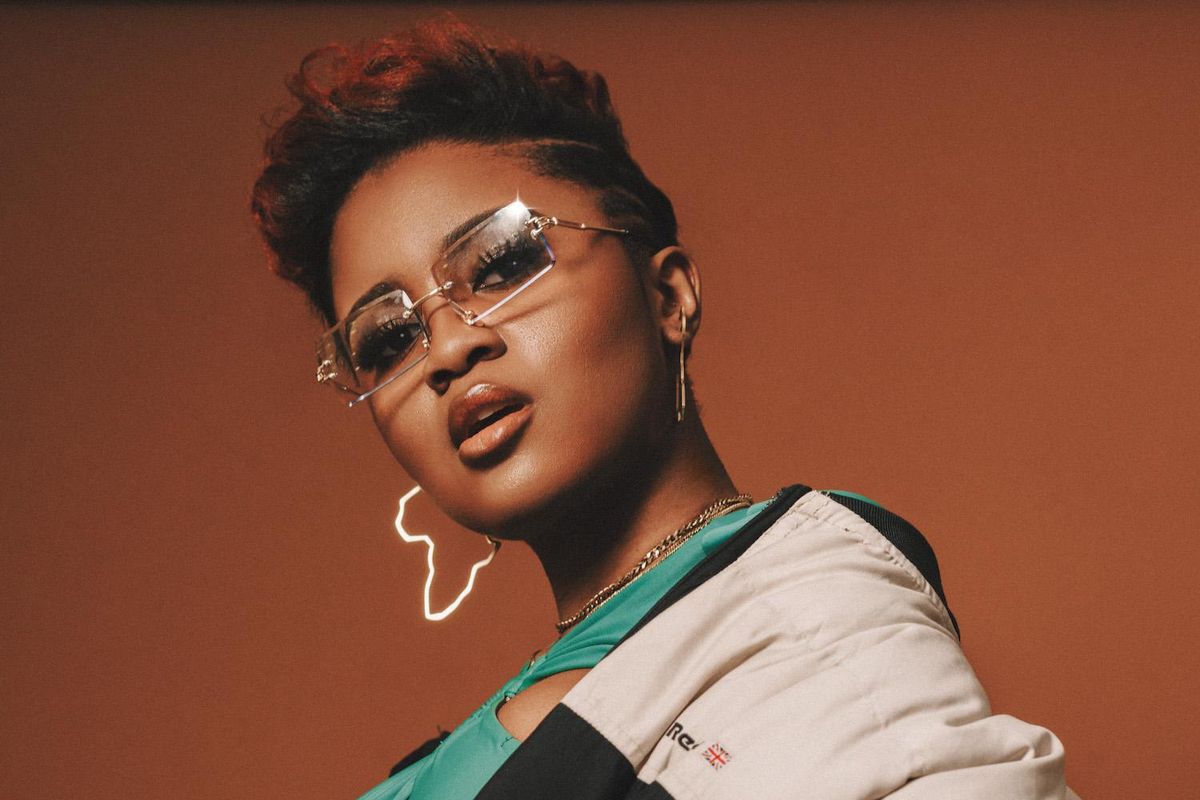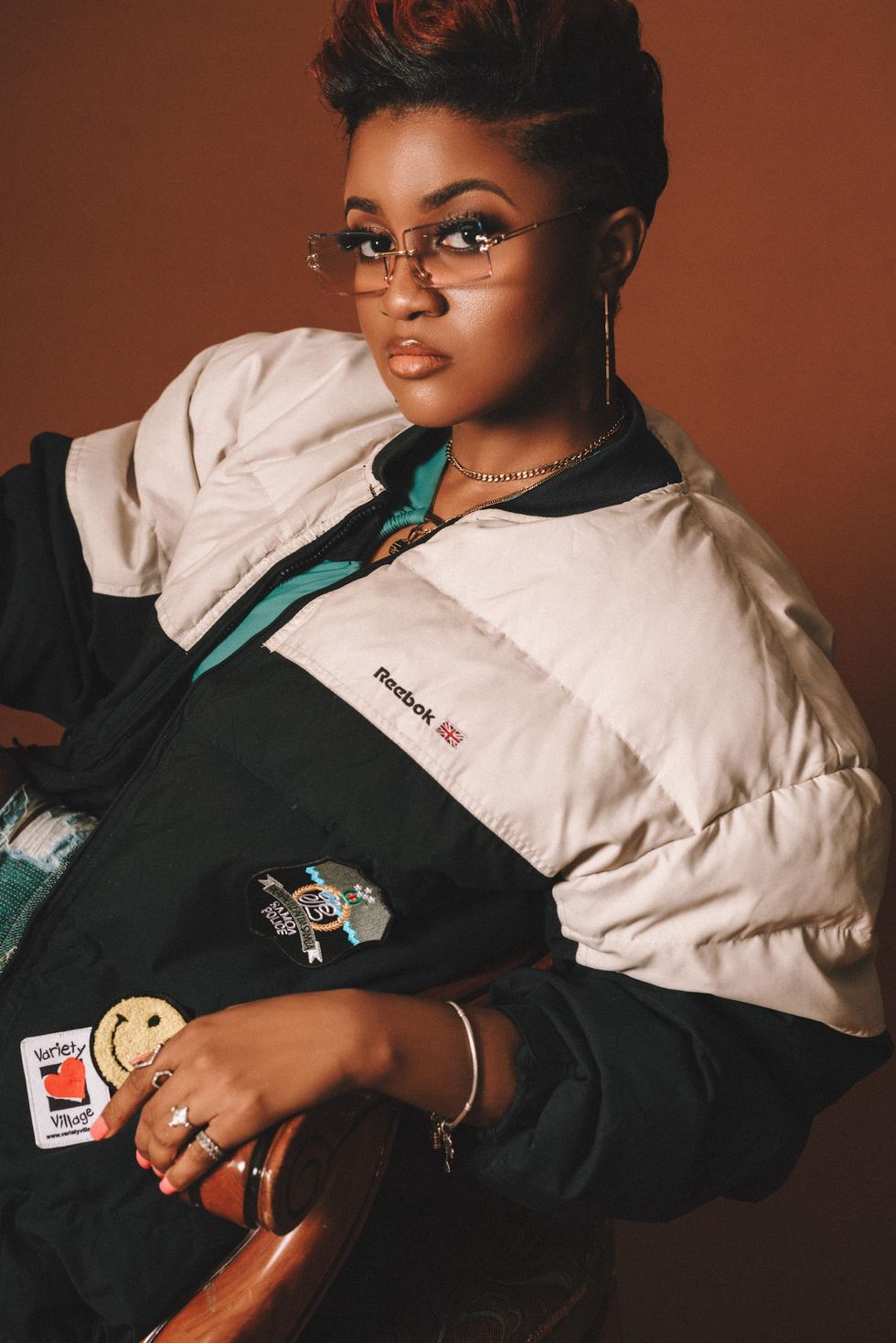Dunnie Is Blazing the Trail for Women in Afrobeats Music Production
The Sarz Academy alumni recounts her journey to becoming one of Nigeria’s most sought-after producers.

“She is not a normal person,” says Falz as Wande Coalnarrates his experience working with Dunnie ahead of his forthcoming album. In a recent interview, Wande Coal also admitted to having never worked with a female producer before Dunnie. “I have never seen a female producer that crazy,” he stressed.
Dunnie’s tenacity over the years has led her to rooms where she now creates magic with music industry elite. Born Oladunni Lawal, her interest in music dates as far back as she can remember, “I would drum on buckets in the house and break a lot of them, until my mom asked that I join the school’s band but sadly, they wanted just boys.”
Following a bout of attempts at music production after high school, Dunnie opted for songwriting and ran with it until an epiphany in 2017. “Things got harder as Buhari came to power,” she said, “I needed to survive somehow, so I quizzed myself about the things I’m good at and how to monetize them. I can play a couple musical instruments, I have a laptop - meaning I can learn to make beats and sell them.” Despite her perceived grit at the time, “it didn’t help that I did not see or know any female producers to draw inspiration from,”she mentions.
The dearth of female producers in music also extends to developed markets as only a minute percentage of records across global charts, airwaves, playlists are produced by women. Dunnie has, in the last four years, inched towards this moment where she is smashing stereotypes and championing a course for women music producers in Africa. “Producers like Saszy, Bloody Civilian, Milakeyzz are coming out in their numbers. What they need is for more people to support and trust them.”

In 2018, Dunnie was shortlisted as an alumni of The Sarz Academy alongside then-budding producers like P.Priime and Tempoe. “That opportunity was the beginning of some really amazing moments in my career and I don’t take it for granted.” She would later draw the curtain on that year with the release of her debut project as an artist dubbed Seven. The project features Ric Hassani and Fiokee.
Dunnie is rightly reckoned as one of few talents harmonizing their all-round creativity as an artist, producer, music director with considerable track record to match.“I am a lot of things,” she asserted, “but I try to not be all these things to everybody, to avoid confusion.” Her list of collaborators include Focalistic, Yemi Alade, Niniola, Busiswa, Rowlene, Becca, and Gemini Major. “It's interesting how they discover me by different means—through my work as either a producer or artist. Others, like Cassper Nyovest, knew about me through social media.” She credits East Africa as one of the regions where she’s most acclaimed, hence the collaboration with Kenya’s H_art the Band and Tanzania’s Darassa on Amazon, her third project, which also features Nigerian Highlife sensation, The Cavemen. “Every song in the project can fit into a motion picture. I wanted to create afrobeats with cinematic expression,” she says.
Dunnie - Akooba (Visualizer)youtu.be
Last year, she was profiled by Global Citizen as one of the kick-ass women in Nigerian music amongst powerhouses like Bose Ogulu, Vanessa Amadi and others. “It's an honour to be referenced amongst such powerful and amazing women.” She was the only musician mentioned. Despite the nerve it must’ve required to take the reins in such an uncharted territory, Dunnie is not always benumbed to the throes of being the only woman in the room. She’d at some point taken to social media to recount some of these experiences. “So weird being the only female in a professional setting and then one of your colleagues thinks it's okay to ask you to serve food,” she wrote, “what’s even weirder is he has the guts to be shocked when you refuse to.”
During our conversation, she further opened up about her concerns especially at late-night sessions in a room inundated with the opposite sex most times; “I just start creating scenarios on how to defend myself if anything happens. Nobody should feel that way while doing a legitimate job.” Nonetheless, Dunnie is quick to draw the line on perceived chivalry as she reiterates her riot act, “I would rather you work with me because you love my work and not because I have a vagina.”
In a relatively short time, Dunnie is reputed as a force in soundtracking campaigns for multinationals like Ciroc, Oppo, Kotex, and Keystone bank.. “It all started from Sarz Academy when the instructors educated us about multiple opportunities for producers. Synchronization sounded like magic to me as I don’t always have to rely on artists directly.”
While Dunnie culls these accolades and seeks to expand her discography, she holds the induction of more women in production with similar priority. In that respect, she partners with Audio Girl Africa, an NGO that fosters the inclusivity of women in the music industry. “My position in the Nigerian music industry is peculiar, as more women can see it's possible to be producers, DJs, sound engineers…. That’s why we, sometimes, partner with high schools because the goal is to catch them young.”
- Meet the Producers Behind Afrobeats' Latest Hits - OkayAfrica ›
- Call Us by Our Name: Stop Using "Afrobeats" - OkayAfrica ›
- 2021 Was The Year Afrobeats Took Over - OkayAfrica ›
- The 4 Songs You Need to Hear This Week - OkayAfrica ›
- The 4 Songs You Need to Hear This Week - OkayAfrica ›
- The 10 Best Nigerian Songs of the Month (August) - OkayAfrica ›
- UnitedMasters and Sarz Unite to Find Africa's Next Big Star - Okayplayer ›
- Sarz Unveils New Single "Yo Fam!" Featuring Skrillex and Crayon - Okayplayer ›

